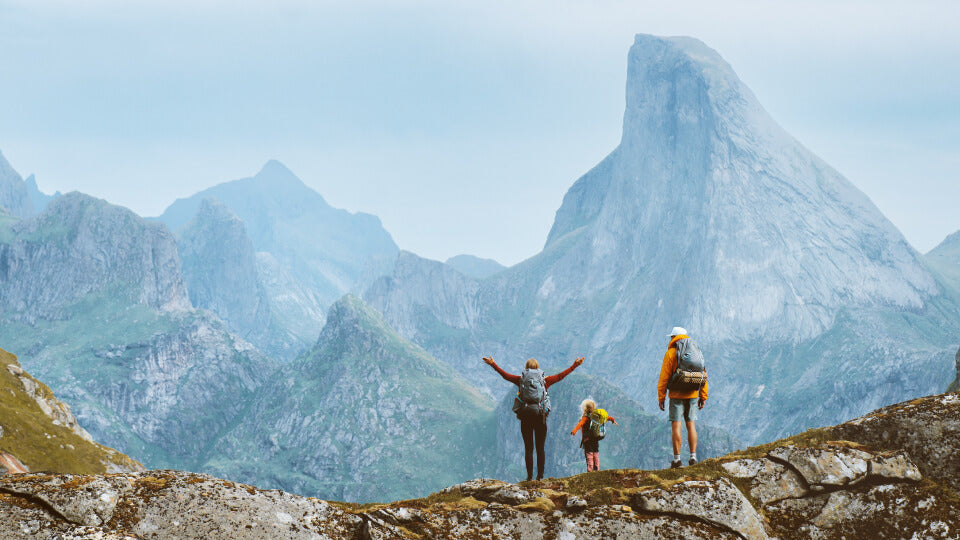Conquering the Mountains: Tips for Flatlanders Training for High-Altitude Adventures

If you're a sea-level dweller who's gearing up for a summer filled with high-altitude adventures, whether it's trail running, hiking, mountain biking, or mountaineering, you're in for a challenge. The thin air and steep terrain of the mountains can be a rude awakening for those more accustomed to the flat lands. But with the right preparation and mindset, you can conquer those summits and thrive in the thin air.
Let's dive into some essential tips to help flatlanders train and acclimate for their upcoming mountain exploits.
1. Embrace the Climb
If you live in a relatively flat area, your training should focus heavily on building lower-body strength and power to tackle those grueling ascents. Incorporate hill repeats (including descents!) stairmaster workouts, squats, and lunges into your strength training routine to strengthen your quads, glutes, and calves. Incorporate a mix of high reps at a light weight (such as your bodyweight) and lower reps at a higher weight. This will help strengthen your uphill and downhill fitness and is a crucial component of your mountain readiness!
2. Simulate Altitude
While nothing truly replicates the experience of high altitude, you can certainly simulate the effects through specialized training. If you plan on spending a lot of time at altitude, consider investing in an altitude training mask or using a hypoxic training system to replicate the reduced oxygen conditions you'll encounter in the mountains. This can help your body adapt to the physiological demands before you even set foot on the trail. If you don’t have access to this kind of equipment, or just want to prepare for one-off vacations, focus on doing plenty of cardio including hiking, running, cycling, and even swimming. Improving your cardiovascular capacity will help you breathe a bit easier at altitude.
3. Dial in Your Nutrition
Fueling your body correctly is paramount when training for and tackling high-altitude activities. Ensure you're consuming adequate carbohydrates to support the increased energy demands, as well as enough protein to facilitate muscle recovery and adaptation. Don't forget to stay hydrated, as the dry mountain air can quickly deplete your fluids.
To further support your body's acclimation process, consider supplementing with Altitude RX. Its proprietary OxyBoost™ complex has been scientifically shown to help reduce the impact of high altitude and expedite the acclimatization process.
4. Gradually Increase Exposure
When it comes to adapting to altitude, slow and steady wins the race. If possible, plan your training schedule to include incremental exposure to higher elevations, gradually increasing the duration and intensity of your workouts. This allows your body to gradually adjust, minimizing the risk of altitude sickness and other debilitating symptoms.
During your actual mountain adventures, be mindful of your pace and listen to your body. It's better to take it slow and steady than to push too hard and risk jeopardizing your safety or the enjoyment of the experience.
5. Prioritize Recovery
High-altitude activities place immense demands on your body, both physically and mentally. Ensure you're prioritizing adequate rest and recovery between training sessions and during your mountain ventures. This may mean scheduling more frequent rest days, incorporating active recovery modalities (stretching, epsom salt baths, foam rolling, massages, etc.), and ensuring you're getting enough quality sleep.
6. Supplement Strategically
In addition to Altitude RX, consider incorporating other targeted supplements to support your mountain readiness. Omega-3 fatty acids can help reduce inflammation, while antioxidants like vitamin C and E can bolster your immune system to ward off illness during your travels.
7. Adjust Your Mindset
Conquering the mountains requires more than just physical preparation — it also necessitates a strong mental game. Adopt a positive, growth-oriented mindset, and be prepared to embrace the challenges that come with training and adventuring at high elevations. Visualize your success, celebrate small victories, and don't be discouraged by setbacks.
Remember, everyone acclimates to altitude differently, so be patient with yourself and don't compare your progress to others. Stay focused on your own journey and celebrate the small wins along the way.
By following these strategies, you'll be well on your way to conquering the mountains and making the most of your summer high-altitude adventures.
Take the next step in your training regimen: Try any BRL Sports supplement risk-free! If our natural nutritional products aren’t the best you’ve ever used, simply return your purchase for a 100% refund — no questions asked!
Also in Inspiration & Perspiration

Extreme Endurance: How Elite Athletes Train Beyond the Limit
Explore how elite athletes train for extreme endurance. Learn what it takes to build physical and mental capacity for ultra-distance performance.

Marathon Training Nutrition: Complete Fueling Guide from Base Building to Race Day
A practical guide to marathon training nutrition, with fueling strategies, common mistakes to avoid, and how to adjust your intake from base to race.

Creatine vs Pre Workout: Which Should You Take? (Or Both?)
Creatine and pre workout serve different goals. Learn how they compare, when to use them, and whether stacking both is right for your routine.


